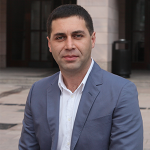
Özgür B. Akan was born in Ankara, Turkey. After high school education in Ankara Fen Lisesi (Ankara Science High School), he received the B.Sc. and M.Sc. degrees in electrical and electronics engineering from Bilkent University and Middle East Technical University, Ankara, Turkey, in June 1999 and January 2002, respectively. He received the Ph.D. degree from the School of Electrical and Computer Engineering, Georgia Institute of Technology, Atlanta, in May 2004. He is currently a full Professor with the Department of Electrical and Electronics Engineering, Koc University, the Director of Graduate School of Sciences and Engineering, Koc University, and the Director of Next-generation and Wireless Communications Laboratory (NWCL). His current research interests are in nanoscale and molecular communications, neural communications, 5G and THz wireless communications, Internet of Things, distributed social sensing, space communications, underwater acoustic communications, signal processing, information theory.
Prof. Akan is an Associate Editor for IEEE Transactions on Communications, IEEE Transactions on Vehicular Technology, IET Communications, International Journal of Communication Systems (Wiley), European Transactions on Telecommunications, Nano Communication Networks Journal (Elsevier). He served as an Editor for ACM Wireless Networks (WINET) Journal (2004-2010), Area Editor for AD HOC Networks Journal (Elsevier) (between 2004-2008), as a Guest Editor for many special issues for several journals. He is currently the General Co-Chair for IEEE INFOCOM 2017, and served as the General Co-Chair for ACM MobiCom 2012, IEEE MoNaCom 2012; TPC Co-Chair for ACM NanoCom 2014, IEEE ISCC 2012, ACM MSWiM 2010; and organizing committee member for various international conferences. He is the Vice President for IEEE Communications Society – Turkey Section. He is an IEEE Senior Member, and a member of ACM.
Prof. Akan is awarded the European Research Council’s (ERC) Consolidator Grant for 2014-2019. He is appointed as IEEE Communications Society (ComSoc) Distinguished Lecturer effective January 2011. He received the Koc University Outstanding Faculty of the Year Award 2014, Koc University,TUBITAK Young Scientist Award 2014, The Scientific and Technological Research Council of Turkey (TUBITAK), Promising Scientist Award 2014, Kadir Has University, Young Scientist Award 2014 (BAGEP 2014), The Science Academy, Scientist of the Year Award 2013, Bilim Kahramanlari Dernegi, Outstanding Faculty of the Year Award 2012, Faculty of Engineering, Koc University, IBM Shared University Research (SUR) Award 2011, IEEE Communications Society 2010 Outstanding Young Researcher Award for Europe, Middle-East and Africa Region, IBM Faculty Award 2010, METU Thesis Advisor of the Year Award 2010, IBM Faculty Award 2008, Turkish Academy of Sciences Distinguished Young Scientist Award 2008 (TUBA-GEBIP), METU Outstanding Young Researcher Award 2008, 2006 Parlar Foundation Research Encouragement Award, 2006 Editor of the Year Award from AD HOC Networks (Elsevier) Journal, Best Paper Award in IEEE ISCN 2006, TUBITAK-Career Award in 2005, and 2003 Researcher of the Year Award in Broadband and Wireless Networking Laboratory, School of Electrical and Computer Engineering, Georgia Institute of Technology.
Abstract
First ERC Consolidator Grant for Turkey
The European Research Council has awarded its first Consolidator Grant to Professor Özgür Barış Akan of the Department of Electrical and Electronics Engineering Koç University, Turkey.
The ERC Grants awarded by the European Research Council (ERC) are the most prestigious form of European research funding. From among 3680 candidates across Europe, Prof. Akan’s project, titled “MINERVA: Communication Theoretical Foundations of Nervous System Towards Bio-Inspired Nanonetworks and ICT-Inspired Neuro-Treatment”, has been awarded the ERC Consolidator Grant with an amount of 1.8 Million Euro for 5 years starting in March 2014.
The project aims to develop communication theoretical models for nervous system, a nanonetwork simulator to validate the theoretical models, as well as communication-capable neuro-implants for the treatment of spinal cord disorders, which are currently incurable in most cases. Together with the previous contributions of Prof. Akan in nanonetworks, the outcomes of the MINERVA project are expected to pave the way for the realization of emerging nanonetwork applications ranging from intra-body networks for health monitoring, ICT-inspired diagnostic tests to ICT-inspired treatment of neural disorders, all of which will have a significant impact on the society.
MINERVA project is very significant in that it is the first in Turkey to receive the Consolidator Grant from ERC. Bridging the gap between engineering and life sciences, the project has already yielded several important interdisciplinary collaborations within Turkey and internationally. This is a truly unique opportunity to use the extensive experience in ICT for direct impact on human life.

